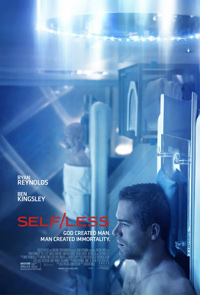Reviews
Self/less | Review
The Change-Up: Singh Sleepwalks Through Sci-Fi Stock
 Time is not on anyone’s side in director Tarsem Singh’s latest blunder through familiar material, Self/less, a mash-up of recycled sci-fi tropes drained of innovation or potential potency. Issues of class, identity, and health insurance get chugged through the blender of David and Alex Pastor’s script, the directing/screenwriting duo’s foray into the English language. Singh, known for expressively beautiful visuals, presents his most demurely dressed feature to date, though his usual ocular trickery may have offered a slight reprieve from the crushing banality of the laughably conservative moral fable proffered here.
Time is not on anyone’s side in director Tarsem Singh’s latest blunder through familiar material, Self/less, a mash-up of recycled sci-fi tropes drained of innovation or potential potency. Issues of class, identity, and health insurance get chugged through the blender of David and Alex Pastor’s script, the directing/screenwriting duo’s foray into the English language. Singh, known for expressively beautiful visuals, presents his most demurely dressed feature to date, though his usual ocular trickery may have offered a slight reprieve from the crushing banality of the laughably conservative moral fable proffered here.
Damian (Ben Kingsley) heads his own self-built empire, but finds he’s been diagnosed with cancer and doesn’t have much longer to live. He has a troubled relationship with his daughter, Claire (Michelle Dockery), but finds he’s not quite ready to call it quits. He’s been made aware of a new cutting edge medical procedure called ‘shedding,’ which allows one’s consciousness to be transplanted in a new, younger human organism. Damian is assured by Dr. Albright (Matthew Goode), the head of the secret organization offering the procedure—the organisms are lifeless bits of matter grown in his lab. Agreeing to undergo the shedding, Damian engages in a very public death and awakens with a younger body (Ryan Reynolds). Beginning his brand new life in New Orleans, Damian must take a pill every day, explained as a sort of anti-rejection medication. Little by little, he discovers eerie details about the prior life of his new body.
Reynolds’ body-switching comedy The Change-Up (2011) at least provided cheap laughs as it unabashedly ripped through borrowed scenarios. Self/less seems styled after a variety of conscientious, potentially brainy parables reconstituted from the fumes of “Twilight Zone” styled material, such as Neil Burger’s Limitless (2011), or Andrew Niccol’s In Time (2011), which was originally titled along the same playful lines as this film as Im.mortal. But David and Alex Pastor’s screenplay doesn’t offer any kind of ingenious spin, not even making use of modern technological advances, depending solely upon a serum which magically keeps the transplanted consciousness in control of the host body (comparatively, this seems regressive compared to vintage pulp such as Robin Cook’s Coma).
Strangely, this feels uncannily similar to a “Tales from the Crypt” episode featuring a millionaire played by William Hickey, a man wasting his fortune on a younger, masculine body in order to win over the object of his attention, Natasha Richardson. You’ll find no such playfulness here, however, in this over generalized tale of folks either innately good or hopelessly malicious.
Reynolds, once again, proves unable to master the sort of charisma to make these simplistic vehicles palatable, sinking uneventfully with the ship. As such, Self/less will most likely be referenced as one more notch in a string of ill-conceived casting opportunities for a performer desperately in need of material better tailored for his abilities. Matthew Goode is the pretentious and formidably British baddie, while Ben Kingsley isn’t around long enough to instill his broadly written master builder with any real defining characteristics.
Supporting cast members hint at the wider range of possibilities with such a narrative, such as Derek Luke, not given much to do, but representative of how much more interesting this could have been had we not been chained to the milquetoast Reynolds and the continual adherence to white male leads. Likewise, the ethnicity of Natalie Martinez (apparently Alice Braga wasn’t available), saddled with playing a ninny of a spouse, is reduced to a minor plot device. She’s a woeful character, solely around to engage and distract the resurrected Damian by engaging him sexually. “I have to know how different you are from my husband,” she pleads. It’s yet another missed opportunity, considering this could have been beefed up had she been complicit in her husband’s choice to sell his body to save their sickly daughter.
Singh seems even less interested than we are in this incredibly lazy endeavor, surprising considering he’s a filmmaker who sometimes manages to concoct dazzling visuals atop inert narratives. But for a film concerned with dueling consciousness, Self/less doesn’t seem to have one.
★½/☆☆☆☆☆
Los Angeles based Nicholas Bell is IONCINEMA.com's Chief Film Critic and covers film festivals such as Sundance, Berlin, Cannes and TIFF. He is part of the critic groups on Rotten Tomatoes, The Los Angeles Film Critics Association (LAFCA), the Online Film Critics Society (OFCS) and GALECA. His top 3 for 2021: France (Bruno Dumont), Passing (Rebecca Hall) and Nightmare Alley (Guillermo Del Toro). He was a jury member at the 2019 Cleveland International Film Festival.
































